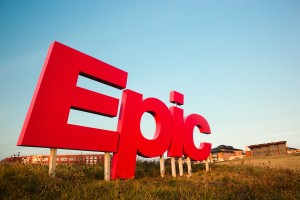12 Unusual Facts About Epic Systems
 Whether you love or loathe their software, Epic Systems’ impact on healthcare IT is undeniable. More than 190 million patients have an electronic record in Epic, and the firm’s clients include the some of the largest hospitals and health systems in the world, including the Mayo Clinic, Johns Hopkins and Kaiser Permanente.
Whether you love or loathe their software, Epic Systems’ impact on healthcare IT is undeniable. More than 190 million patients have an electronic record in Epic, and the firm’s clients include the some of the largest hospitals and health systems in the world, including the Mayo Clinic, Johns Hopkins and Kaiser Permanente.
Founder and CEO Judy Faulkner is known for her aversion to publicity, but curiosity about her company and its corporate culture has grown in recent years in parallel with its rapid revenue growth and increasing market share.
See our Epic Consulting and Permanent Jobs Here.
To satisfy your appetite for all things Epic Systems, read on. Our collection of 12 unusual facts about the software giant may surprise you.
Not always Epic
Started in 1979 as Human Services Computer, Inc., the company wasn’t known as Epic Systems until 1983, when it rebranded in conjunction with the launch of its Cadence patient scheduling software.
Green energy
With 18 acres of solar panels, the company is Wisconsin’s largest generator of solar power. It also owns six wind turbines off campus. Epic says on a sunny, windy day, its campus can operate almost entirely off the grid.
Seeing the world
After five years on the job, Epic employees are encouraged to take a sabbatical, funded by the company, in a country they have never visited before. To date, Epic staff have taken more than 3,000 trips on their sabbaticals to more than 100 different countries.
Clothing not optional
Epic has its own definition of business casual with a dress code that simply requires employees to wear some clothes. “We’ve never had a violation,” quipped Faulkner in a 2015 profile.
On the farm
Epic headquarters is on 1,048 acres in Verona, Wis., some 250 acres of which are rented to local farmers who harvest corn and alfalfa while raising cows and goats. There’s also an apple orchard, planted in 1873.
Disneyland in Wisconsin
A hallway that looks like a New York subway car, an employee treehouse and an office slide are just a few of the notable architectural features on Epic’s offbeat campus. The company hired the architects who designed Disneyland to purposefully create a whimsical corporate environment.
Employer looking for Epic-skilled talent? Contact us.
Charitable giving
CEO Faulkner is one of 136 individuals and families who have signed the “Giving Pledge,” which encourages the world’s billionaires to donate at least half of their assets to charity. In her pledge letter, the Epic Systems founder, worth an estimated $2.6 billion, pledged to give away 99% of her assets.
Art lovers
Much of the colorful contemporary art on display at the Epic campus is acquired from local artists during Madison’s Art Fair on the Square. A team of Epic employees, armed with a generous budget, descends on the fair annually to acquire fun and unusual pieces, like The Banana.
No more donuts
A longstanding tradition of providing free donuts in employee breakrooms on the first Monday of the month was cancelled in 2008 to the consternation of many at Epic. The end of “Donut Day” was widely debated at company meetings, and some employees worried about the economic impact to the bakery that supplied the pastries.
Doll furniture
As a startup, Epic shared space in the basement of a Madison apartment building with the company that created American Girl dolls. When American Girl moved, Epic Systems bought their used office furniture.
Epiconomy
Epic’s growth has undoubtedly lifted the local economy, as 27% of all jobs in Dane County, Wis., created between 2001 and 2012 are credited to Epic’s influence. As more evidence of the Epiconomy: IT workers in the Madison area make, on average, nearly $90,000 a year, and the region has six times the number of software writers as the national average.
No budgets, no problem
Faulkner says Epic employees aren’t bound by traditional budgets. "Our philosophy with that is if you need it, buy it. And if you don't need it, don't buy it," she told Becker’s Hospital Review. "We teach people how to judge things appropriately and make the right decisions, so it isn't chaos by any means. What we did see is that if you have budgets, people spend to their budget."
